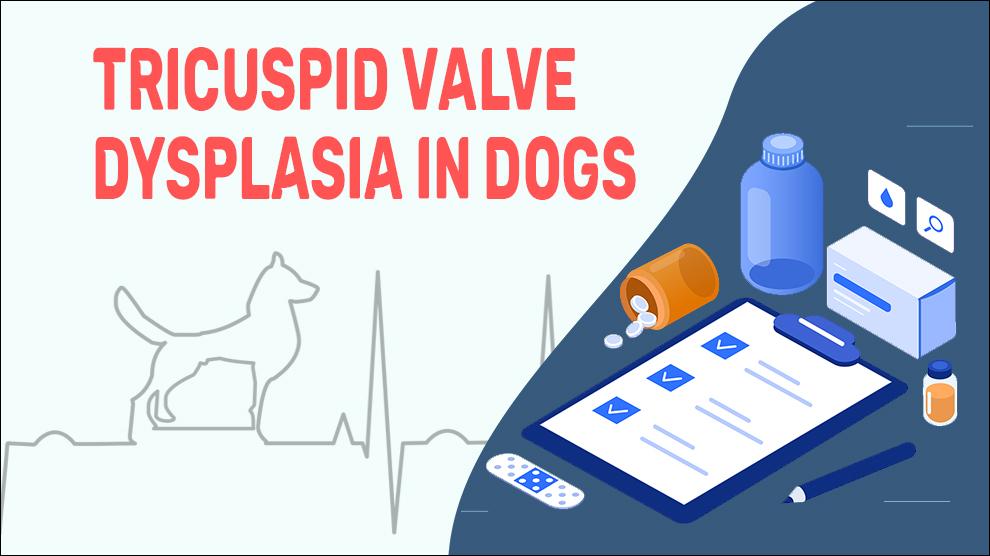What Is Tricuspid Valve Dysplasia In Dogs?
Tricuspid valve dysplasia is a rare, non-inflammatory, cardiac malformation that usually affects the valves that are situated in the heart's two right chambers (tricuspid valve). Eventually, the hardening and outflow of the valves cause’ heart enlargement with resulting worsening of the heart muscle. This accounts for approximately 5% of all heart complications in dogs and it is uncommon in cats.
The dog’s heart is divided into 4 chambers such as 2 atria and 2 ventricles separated by a wall and there are two valves. The tricuspid valve is the valve on the right side of the heart and the valve on the left side of the heart is called the mitral valve. Valves that separate the top chambers from the bottom chambers are called Atrioventricular valves (AV). The pulmonary valve separates the pulmonary artery (the artery that delivers blood to the lungs) and the right ventricle (the lower right heart chamber).
The malfunction of the tricuspid valve causes the blood from the atrium into the ventricle to unusually flow backward through the valve and when the blood is not going where it should, it is called regurgitation. This means the heart’s workload gets increased as it needs to pump a higher volume of blood to the body's needs for normal functions. When the heart cannot fix and maintain the abnormal blood flow, this may lead to congestive cardiac failure.
Symptoms Of Tricuspid Valve Dysplasia In Dogs
- Increased respiratory rate
- Rapid/ shallow or Labored breathing
- Weakness
- Collapse or fainting
- Slow/fast/erratic heart rate
- Exercise intolerance
- Lack of appetite
Treatment Options For Tricuspid Valve Dysplasia In Dogs
NSAIDs like
- Carprofen (Canidryl, Rimadyl, Vetprofen, Rimifin)
- Meloxicam (Loxicom, OroCAM, Metacam)
- Firocoxib (Previcox, Equioxx)
- Galliprant (grapiprant)
Medications: Tadalafil (Cialis, Adcirca), pimobendan (Vetmedin, Heartmedin, and Acardi), imatinib (Gleevac), and sildenafil (Viagra, Aphrodil, Revatio, Granpidam, Vizarsin)
Diuretics (water pills): Spironolactone, furosemide etc. This is to reduce fluid buildup in the body by eliminating extra fluid and salt
Heart complications - ACE inhibitors (enalapril, benazepril, ramipril, and imidapril), diuretics like furosemide, spironolactone, etc. If needed, medications that might be used are sacubitril/ valsartan/ torsemide and/or sildenafil
Valves surgical replacement: Pig valves - porcine valve replacements
Home Remedies For Tricuspid Valve Dysplasia In Dogs
As a matter of fact, herbal remedies may not solve the problem, but they may help to reduce some of the symptoms
Herbs: Ginger, Hawthorn, Dandelion, Parsley, Cayenne
Relaxing herbs: Valerian, Chamomile, and California poppy
Dietary Supplements: Vitamins A, B6, C, and E Carnitine-rich foods, L-Taurine, Coenzyme Q10, Magnesium, and Selenium
How To Prevent Tricuspid Valve Dysplasia In Dogs?
Tricuspid valve dysplasia etiology is still unknown. Specific causes are not yet identified. The most speculated reason is hereditary in some breeds and it is better to check the affected dogs when breeders think about breeding or when you get a dog from a susceptible lineage.
Affected Dog Breeds Of Tricuspid Valve Dysplasia
Boxer, Bull Terrier, Cavalier King Charles Spaniel, Chihuahua, Cocker Spaniel, Doberman Pinscher, German Shepherd, Great Dane, Lhasa Apso, Old English Sheepdog, Toy Poodle, Samoyed, Schnauzer, Yorkshire Terrier, Large Dog Breeds, Borzoi, Great Pyrenees, Irish Setter, Labrador Retriever, Newfoundland, Weimaraner
Causes And Prognosis For Tricuspid Valve Dysplasia In Dogs
1. Cause:
Congenital
2. Mortality:
Overall, Heart valve dysplasia is serious and brings about life-threatening complications without proper treatment. Heart valve dysplasia is the reason for high cardiovascular mortality in dogs.
3. Diagnosis:
- A complete blood count (CBC), chemistry profile
- Abdominal ultrasound
- Cardiac biomarker blood test - NTproBNP
- X-ray
- ECG (electrocardiograph) / echocardiogram
4. Prognosis:
The prognosis for recovery of heart valve dysplasia surgery is excellent, with most dogs recovering completely after suitable treatment.
Veterinary cardiologists say that severe heart valve dysplasia affected dogs will be also having other defects of the heart that are likely to have developed concurrently with the defect itself.
Severely affected Dogs will start to manifest symptoms within the first year of life. For HVD dogs, Congestive heart failure may develop once the heart cannot hold longer the unusual flow of blood.
When To See A Vet For Tricuspid Valve Dysplasia In Dogs?
Contact your vet right away, if you notice:
- Rapid and shallow breathing
- Collapse or fainting
- Slow/fast/erratic heart rate
Food Suggestions For Tricuspid Valve Dysplasia In Dogs
- Home-cooked lean meats (beef, chicken, turkey, fish)
- Beef, fish like tuna, and dairy products - Milk and cheeses
- Plant-based protein sources – Lentils, Chickpeas, potatoes, other Nuts, and Seeds
- Fresh fruit/ vegetables (carrots, green beans, banana, watermelon, apple, and citrus fruits)
- Cooked spinach and potatoes
- Raw meaty bones, raw lamb flaps, or chicken wings
Conclusion
The prognosis for TVD in dogs depends on the severity of underlying conditions and earlier detection. This progressive heart condition can be successfully managed with a positive treatment plan and many affected dogs can live normal lives if other complications have not developed.
So, earlier detection of this progressive heart condition is the best option to begin a positive treatment plan.

















